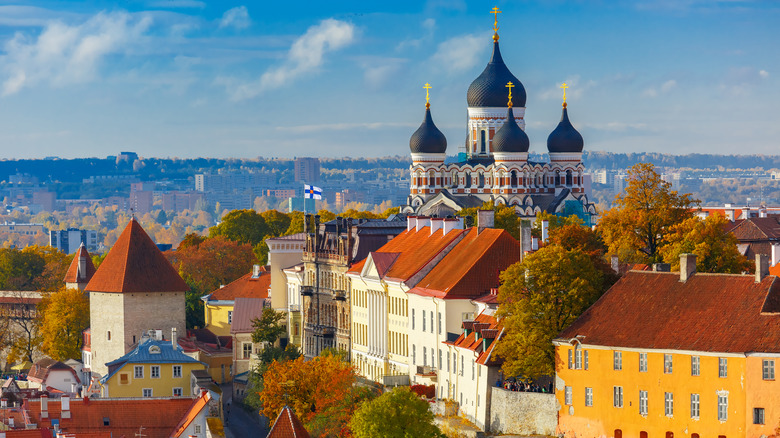Why Retirees Regret Moving To These 9 European Countries
People of all ages dream of moving to Europe. For some retired Americans, settling down in a European country becomes their reality. And while things can go very well, it's also possible to regret immigrating for one reason or another.
One retired couple, doing research before immigrating to the European Union (EU), took to Reddit for advice on what others wish they'd known before their own big move. "We've done lots of research, visited several target countries for longer periods to check out the culture and lifestyles." The responses varied. Said one commenter, "There are healthcare deserts where it's hard to find doctors, and that could be problematic as you age." Another mentioned the tax implications of collecting income in one country while living in another. Though care was taken in gathering information, and some admitted they had done their own research, there are still things one might miss.
While these reflect general regrets expressed by retirees living in different regions of the continent, sometimes, one experiences remorse over a move to a particular European country. For those who have their hearts set on a retirement move to one of the countries on this list, here are some reasons other retirees have regretted relocating there.
Switzerland
Switzerland has much to offer as a retirement destination. This European nation is well-known for its high standard of living, to the point that U.S. News & World Report previously ranked it the number one country in the world. For retirees, it only makes sense to want to move to a country with beautiful scenery, a strong economy, and a well-educated population.
However, there are a few reasons why retired Americans could eventually regret moving to Switzerland. First is the country's notoriously high cost of living. Here, expenses can reportedly exceed $1,500 per month even without factoring in rental or mortgage-related costs. As such, retirees on fixed incomes might find it challenging to maintain a budget that lets them live as comfortably as they did in the United States. Another crucial consideration would be taxes. Treaties exist between Switzerland and the United States to curb double taxation. However, there are circumstances where your pension or social security might be considered taxable income; as such, it's imperative to understand your exact immigration status to avoid unanticipated tax-related expenses.
For U.S. retirees with substantial savings and sizable passive income, Switzerland could still be a great place to relocate. However, if you are concerned about a lower cost of living, this might not be the best European country to move to.
Belgium
When many Americans think of Belgium, chocolate or waffles are likely quicker to spring to mind than the possibility of retiring there. Yet, there are retired U.S. expats who choose to move to this European country and call it home. While many are no doubt thrilled to spend their remaining years in Belgium, there are likely some American retirees who would pass on the chance to settle here if given the choice to do it all over again.
One reason for regret could be the visa process. Belgium does offer a residency pathway for retired foreigners through its long-stay D visa. While the long-stay visa is valid for only 90 days, it's necessary if you wish to qualify for a Belgian residency permit. It's crucial to note that you will also need to have already registered at the local town hall or commune where you'll be living within the first eight business days of arriving in Belgium.
Be warned that Belgium has a notoriously difficult visa process. You could wait three to six months before receiving a decision, and even after seemingly doing everything right, still be told no. Some have gone as far as to deem Belgian's visa process as "Kafkaesque" in nature and remarkably inflexible. This is a shame, as the $1,200 per month financial threshold for individuals is rather forgiving compared to the income requirements for other European countries. If you are able to leap through the hoops, make in-person appearances, and are willing to stick things out, you may eventually be able to retire here. However, for the time spent and intensive nature of he process, some retirees may find a move to Belgium just isn't worth it in the end.
Spain
Financially speaking, a move to Spain makes sense for many retirees. According to Numbeo, the cost of living, excluding housing costs, is about 25.6% less than in the United States. Meanwhile, rent expenses are 44% lower in Spain. For retirees fixated on living costs, Spain checks boxes on paper.
However, if your passive income is below the nearly $2,800 per month minimum, you will struggle to qualify for Spain's non-working permanent residency visa. Americans can visit visa-free for up to 90 days within any 180 day period. But if you're looking to settle indefinitely, it's probably best to move on from considering this country as a long-term option.
Financial difficulties aside, some potential ex-pats remained concerned about shifting politics in the region; racism and Islamophobia-related discrimination are potential deterrents to a long-term move. Moreover, local tensions related to tourism has apparently caused some travelers to avoid Spain outright. It would make sense for this reluctance to extend to a planned move.
Iceland
When it comes to retiree lifestyles, Iceland enjoys a stellar reputation. In 2023, CBS reported that a Natixis Investment Managers study ranked Iceland 3rd out of 44 countries for retirement security. Icelandic citizens eventually receive monthly government pensions ranging from $1,400 to $2,800. As for the cost of living, expenses are approximately $1,600 per month.
While retirement may be doable for members of the local population, challenges can arise for Americans attempting a permanent move. First, Iceland currently lacks a permanent visa program designed explicitly for international retirees. Though Iceland has a long-term residency visa, it includes specific financial requirements. Individuals must show income of at least $2,000 per month; for married couples, their dual income must be at least $3,200 each month.
Even if you meet the minimum qualifications for a long-term visa, you may get to Iceland and realize that you're not a fan of the weather. Cold temperatures might be generally unpleasant for some; however, with age comes an increased risk for cold-weather-related health issues. Iceland is very far north, which results in cold, dark winter months. If you'd like a more affordable location with lots of sunlight, then this European nation isn't likely to be the best choice.
France
In recent years, France has experienced a notable uptick in Americans becoming permanent residents. According to the French Interior Ministry, this trend has seen U.S.-born expats outpace even Britons in numbers. It's reported that in 2024 alone, over 13,000 Americans received their first French residency cards, a 5% increase over the previous year. While some expats are outright motivated by dissatisfaction with the Trump administration, others are simply American retirees who fell in love with the romance of Paris or the slower pace of the French countryside.
Whatever your motivation could be for wanting to move to France, it's possible that after retiring here, you might ultimately regret the decision. A blogger named Diane runs the Oui In France website, where she shares insight into her life as an American expat living in France. She revealed that while she didn't regret moving in her 20s and has settled into life with her French husband, she has strong misgivings about the concept of moving there at retirement age. "I've been here since 2012," said Diane, "and it's still confusing for me at times. Between the mutuelle and the sécu reimbursements and the non-conventionnée this and that, my head sometimes spins."
Another reason retirees may feel remorse about deciding to relocate to France is that the nation is in the midst of growing economic and political instability. While France does enjoy a lower cost of living than the United States overall, uncertainty regarding the nation's short and long-term financial stability should make you strongly reconsider a move here as a retired American.
England
England is one of the few European countries that shares a native language with the United States, making American expats feel somewhat comfortable that they will be understood. While there are certainly cultural differences, U.S. retirees can at least approach communication with relative ease. Still, there are reasons retired Americans may come to regret moving to England.
In most cases, Americans might not feel the effects of the infamous "Brexit" break between England and the European Union; this might not be true for Americans with dual European citizenship. That will change should you decide to become an English citizen. Though retired Americans won't face limits based on work or business, those who become citizens may encounter barriers to trade and travel.
As for visas, some complain that British visas are more complicated to obtain than those in other European countries. If things weren't complicated enough for well-educated, working-age Americans, England lacks a pathway to citizenship or permanent residence specifically for retired foreigners. Instead, it seems England continues to prioritize foreign workers in specific, much-needed industries. You may still be able to qualify for a move here under the Indefinite Leave to Remain visa, provided you meet specific qualifications, such as having already lived and worked in England for a certain amount of time. You may also be able to move if you or your spouse is a native of England or has family there. When all is said and done, it's still possible to get your permanent move to England. Still, the time and tedious bureaucratic red tape could understandably cause some American retirees to regret all the trouble of moving here.
Scotland
Similar to England, U.S. retirees who relocate to Scotland will likely enjoy scenic countryside views and the ease of communicating with most citizens. Just the same, some regrets can emerge related to visa-related bureaucracy and "Brexit" woes. However, retired Americans who decide to move to Scotland may find themselves struggling to live comfortably there for an entirely different reason: an ongoing cost-of-living crisis.
A government report examined the ongoing economic struggles in Scotland and found that much of the turmoil could be attributed to multiple factors, including inflation over the past few years. The report noted that fuel costs had increased by an average of 90% in Scotland between March 2021 and March 2024. Food prices also rose 31%, while wage increases lagged, growing only 18% over roughly the same period.
Though working income is not something retired Americans need to worry about, the rapid rise in costs should be very concerning for anyone hoping to maintain a comfortable standard of living on a pension or Social Security benefits. It could mean that, not long after moving to Scotland, this European country becomes just too expensive to live in.
Malta
Malta is a Mediterranean island country with hot summers and relatively mild winters. In addition to its ideal climate, American retirees are said to appreciate the excellent healthcare system and reasonably affordable standard of living. Another bonus is that English is widely spoken there. With easy communication and an already embedded network of U.S. expats, some retirees feel they'll naturally enjoy life on this island.
Unfortunately, Malta isn't for everyone, and some Americans of retirement age could find it a poor fit for their needs. For instance, if you're used to having a lot of space or to driving long distances, then Malta will require some serious life adjustments. It is a small island with a dense population; there's only so much room for so many people, and you could find it to be a bit too crowded, especially if you're a retired American coming from a more sparsely populated area of the United States. Another downside to Malta is its lack of natural resources and its heavy reliance on imports. This can not only affect the availability of specific products but also their prices, putting them beyond the reach of retirees on tight budgets.
Malta could be worth the trip, but you should consider a trial stay before fully committing to a move. Louise Slyth did just that. In her article for Business Insider, she shared that while Malta had a lot to offer, she ultimately nixed a permanent move. "I knew within days of arriving that I wasn't meant to live there," said Slyth. "Even the endless sunshine couldn't lessen my sense of claustrophobia on the small island."
Estonia
Estonia is a charmingly small but very modern European country that was previously voted the best place to retire. That retirees would want to move here should therefore not be too much of a surprise. While Estonia is a popular destination for some retirement-aged foreigners, some Americans could find that the decision to move here over other European alternatives is one they come to regret.
First, it's worth noting that Estonia lacks a visa program specifically aimed at older foreign residents. Your next best hope for permanent residency is the long-stay or "D" visa. The process requires appearing in person before an authorized location responsible for handling Estonian visas or "a service point of the Police and Border Guard Board in Estonia." You must also be able to demonstrate an income of at least $2,444 per month, per person. If you're a retired couple with a combined passive income that doesn't quite match the minimum, you'll miss out on the long-stay visa.
Even if you did meet its financial qualification, you'll only be allowed to remain in Estonia for a maximum of "548 days within 730 consecutive days." As such, some might find it too much trouble in the end.









